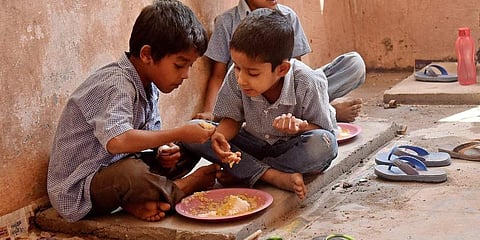India ranked 105th out of 127 countries in Global Hunger Index 2024
The 19th Global Hunger Index (GHI) report for 2024 has ranked India 105th out of 127 countries, placing it among nations with 'serious' hunger problems. India lags behind its neighbours Sri Lanka, Nepal, Myanmar, and Bangladesh, while it ranks just above Pakistan and Afghanistan.
Jointly published by 'Concern Worldwide' and 'Welthungerhilfe', the GHI series tracks hunger worldwide, focusing on areas where urgent action is required. India’s score of 27.3 in the 2024 report reflects a serious level of hunger. The report notes a slight increase in the prevalence of undernourishment in India in recent years.
While India's 2024 score shows some improvement from its 2016 GHI score of 29.3, which also fell under the 'serious' category, it is still far behind its neighbours. There has been considerable progress compared to the scores of 38.4 and 35.2 in 2000 and 2008, respectively, both of which were categorized as 'alarming'.
The 2024 report is not directly comparable to the 2023 report due to a change in methodology and revised data. However, it provides comparative data for the years 2000, 2008, 2016, and 2024.
India continues to face severe challenges in child malnutrition, with the highest child wasting rate (18.7%) globally. The country also has a child stunting rate of 35.5%, an under-five mortality rate of 2.9%, and a prevalence of undernourishment at 13.7%.
While India has significantly improved its child mortality rate since 2000, child undernutrition remains a critical issue, with both wasting and stunting rates still alarmingly high. The report emphasises that although stunting has reduced since 2000, these indicators continue to pose serious public health challenges.
The 2024 GHI highlights that global progress in reducing hunger has stagnated since 2016, making the goal of achieving Zero Hunger by 2030 increasingly unlikely. Of the 127 countries assessed, 42 still experience either 'alarming' or 'serious' hunger levels.
The report also establishes a direct connection between hunger, climate change, and gender inequality, noting that “discriminatory norms and gender-based violence often place women and sexual and gender minorities at heightened risk of food and nutrition insecurity and climate change impacts while hampering their ability to cope with these challenges”.

